Book contents
- Frontmatter
- CONTENTS
- Acknowledgements
- List of Figures and Tables
- Abbreviations
- Introduction: Spiritual Friendship and Rigorist Devotional Culture
- 1 Prelude: A Spiritual Pedigree
- 2 Out of Egypt
- 3 Guardians of the Soul
- 4 Solitary Temples and Empty Shrines
- 5 In Pursuit of Solitude
- Conclusion
- Notes
- Works Cited
- Index
1 - Prelude: A Spiritual Pedigree
- Frontmatter
- CONTENTS
- Acknowledgements
- List of Figures and Tables
- Abbreviations
- Introduction: Spiritual Friendship and Rigorist Devotional Culture
- 1 Prelude: A Spiritual Pedigree
- 2 Out of Egypt
- 3 Guardians of the Soul
- 4 Solitary Temples and Empty Shrines
- 5 In Pursuit of Solitude
- Conclusion
- Notes
- Works Cited
- Index
Summary
One autumn during the late 1630s, a young Anne-Geneviève de Bourbon-Condé, and three of her female companions vacationed at the château de Liancourt, north of Paris, in the Vallée de la Brèche. Part of the sojourn was spent composing a poem in honour of Charlotte-Marguerite de Montmorency, princesse de Condé. The occasion was the feast of All Saints and the women were writing to their female friends back in Paris with a literary tribute to the princess's beauty:
After having prayed to the holy band,
described in detail in the legend,
all the new hosts of the happy Paradise,
and those of yore.
It remains for us to implore a living saint,
a charming saint,
whose beauty appears in an eternal lustre
an eternal miracle.
The authors of the verse were Julie d'Angennes, mademoiselle de Rambouillet (1607-71), Élisabeth-Angélique de Montmorency-Bouteville (1627-95), Marie-Antoinette de Loménie de Brienne (1624-1704) and Anne-Geneviève de Bourbon-Condé – known then as mademoiselle de Bourbon. As part of their devotions on the day of All Saints, the retreatants celebrated the unparalleled beauty of the devout princesse de Condé in their letter to siblings Anne (d.1684) and Marthe (1622-65) Poussart du Vigean. It is unclear as to whether the ‘holy band’ to whom they prayed were drawn from Jacobus de Voragine's thirteenth-century bestselling collection of saints lives the Golden Legend, but their poetry was certainly inspired by the holy figures commemorated on 1 November, as suggested by its overtly hagiographic tone.
- Type
- Chapter
- Information
- Female Piety and the Catholic Reformation in France , pp. 23 - 32Publisher: Pickering & ChattoFirst published in: 2014



